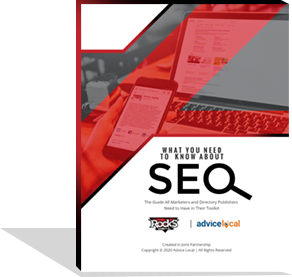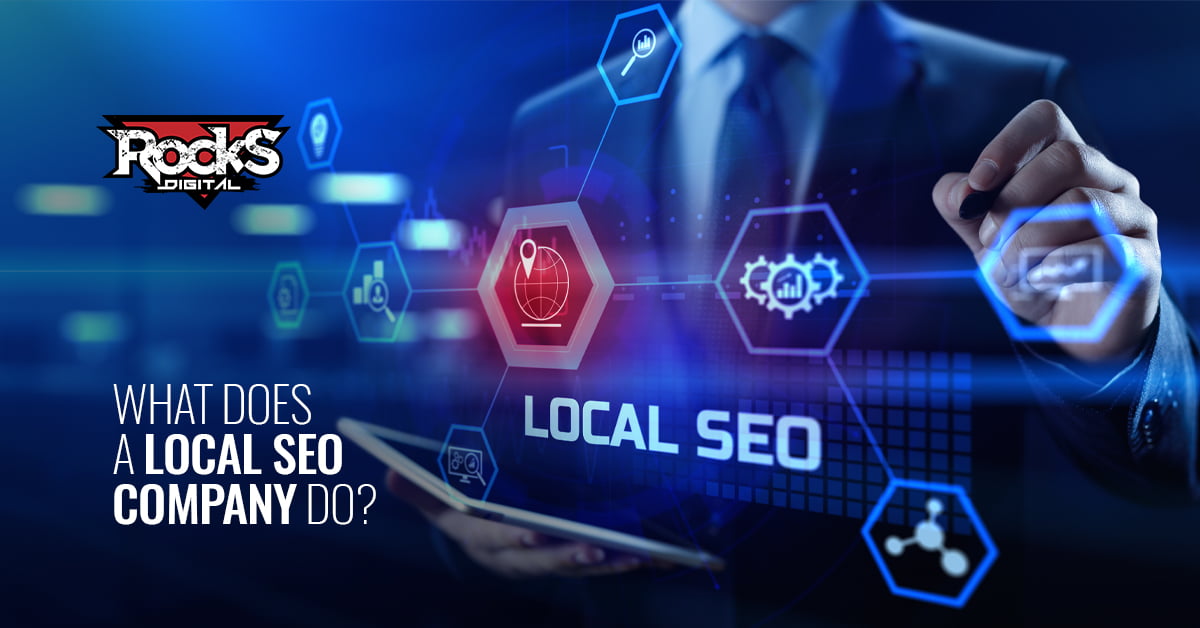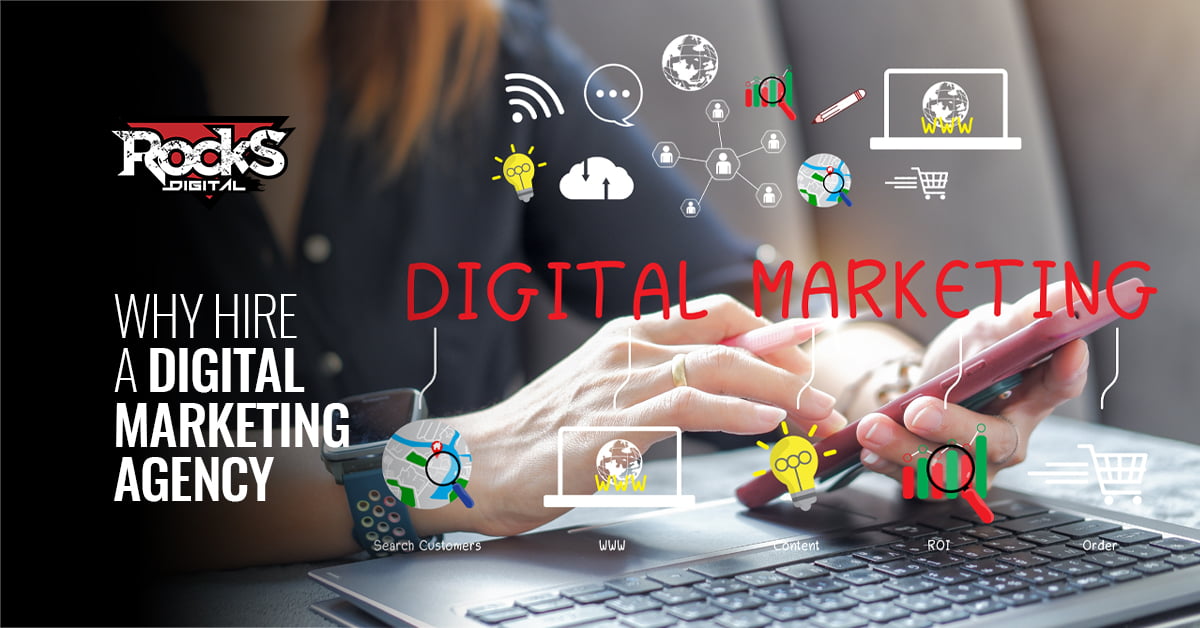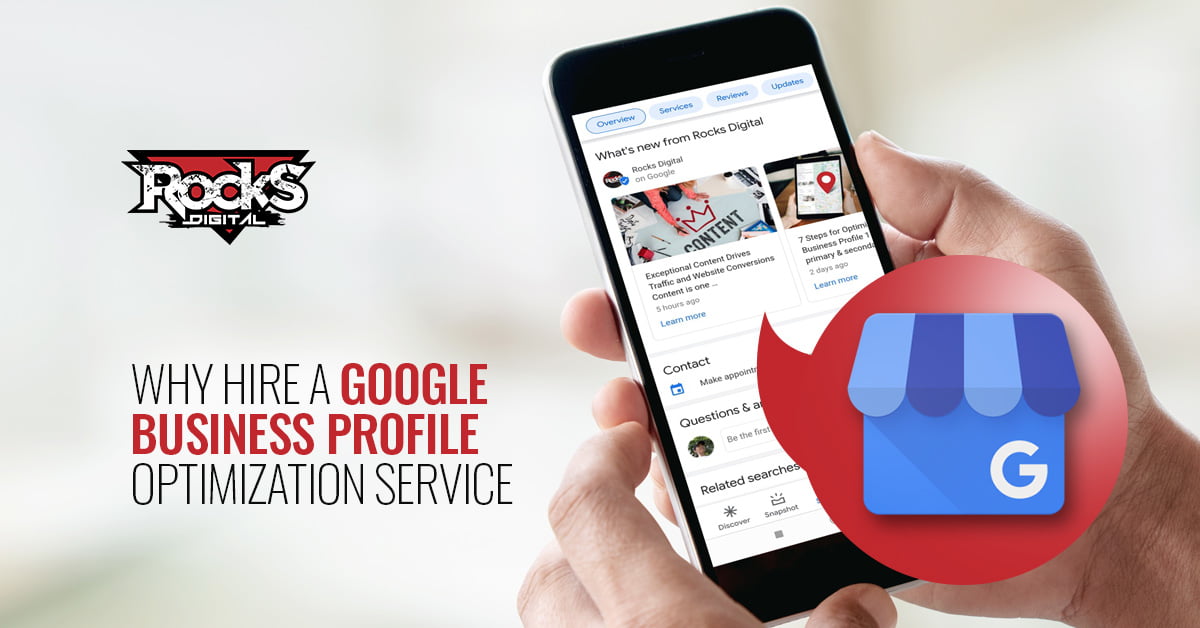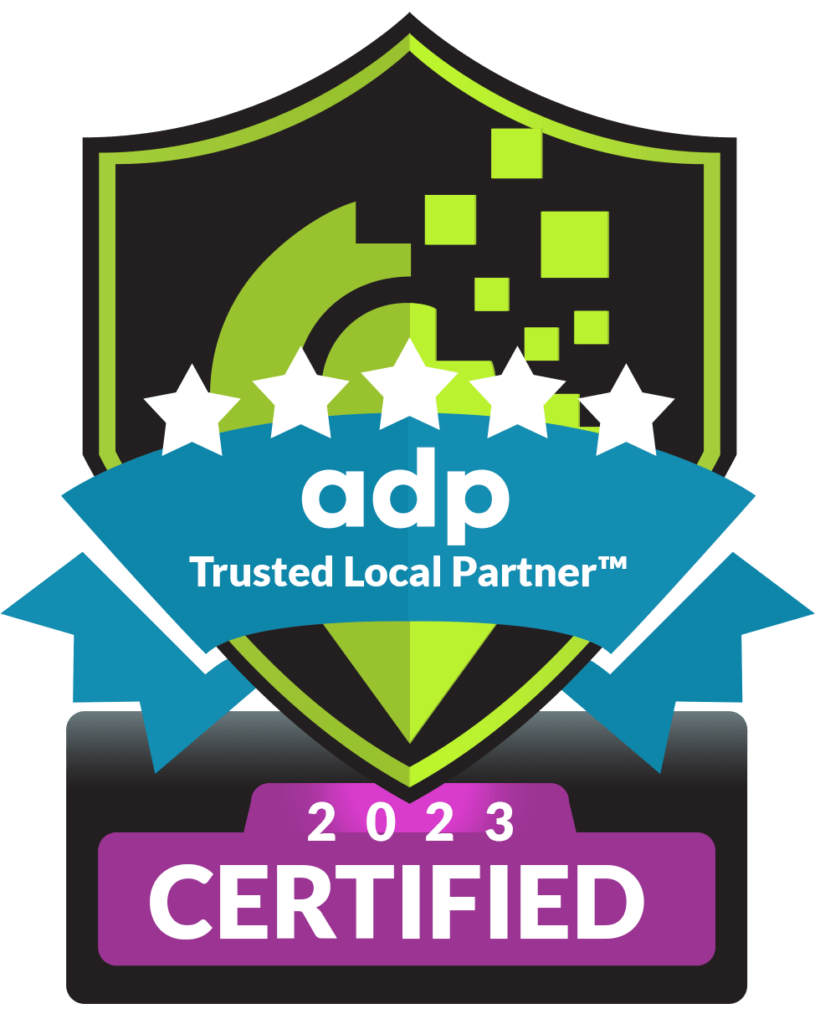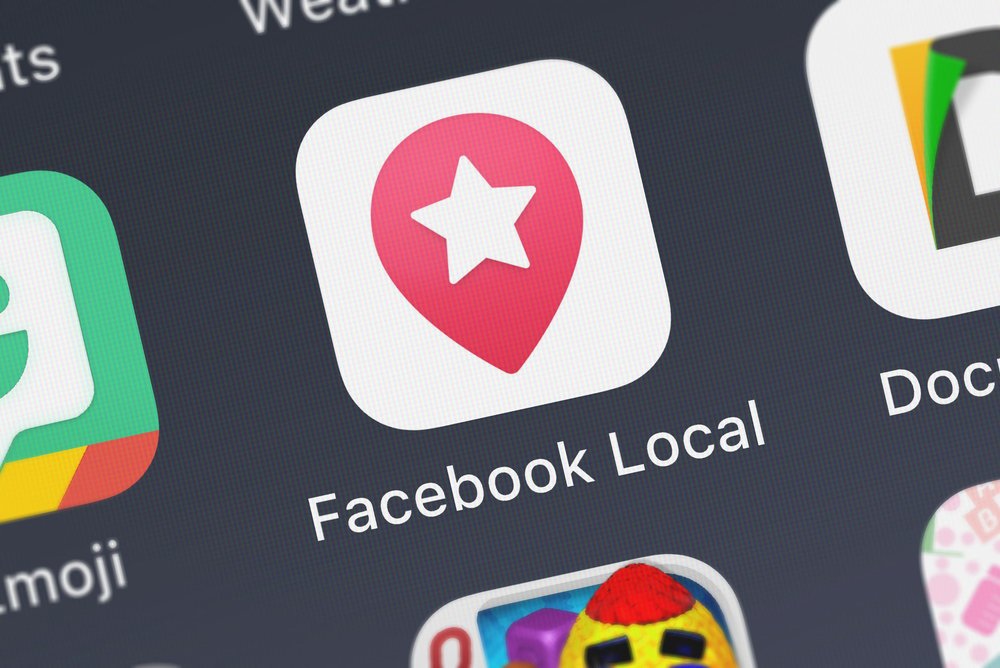
It may seem like an easy task to create and manage a local Facebook Business Page, but you have to put in some thought and time in order to maintain an engaged and loyal local fan base. By using the right tools, tactics, and Facebook features strategically, you can reach the desired audience, make Facebook an effective part of your customer-service strategy, and drive more customers to your storefront.
Make Your Local Facebook Business Page Work for Your Business
In this article, you will find 8 do’s and don’ts to follow in order to master and get benefits from your local Facebook Business Page:
1. Do: Use Facebook Local Awareness Campaigns to Promote Your Local Business
Facebook has made radical changes to its interface and its main news feed of late – for example, the global rollout of Facebook Explore Feed. Facebook users are now predominantly exposed to selected friends’ updates and sponsored content. The result: more Facebook Business Page owners are complaining about seeing dramatic drops in their pages’ organic reach and engagement. One of the most effective things you can do to reduce the negative effect of Facebook’s ranking algorithm updates is to start promoting your content. The simplest way is to boost your posts, but you should consider the recent restrictions on boosting some types of posts. These kinds of ads are a good option for promoting local events or special offers because they are optimized for engagement.
If your goal is to reach more people in your local area who might be interested in visiting your business location, you’d better start running a local awareness campaign. You can tightly target your prospects based on Facebook’s detail targeting categories, such as age, location, job title, education, relationship status, interests, behaviors. You can upload a custom contact list to connect with your current customers and website visitors on Facebook, or create audiences that are similar to your existing clients to expand your reach even further.
2. Do: Collaborate with Other Local Businesses
Team up with your partners (distributors, resellers, franchisees) and other small businesses that aren’t direct competitors by jointly promoting contests or events on Facebook. For example, if you are a professional photographer, collaborate with a local children’s clothing shop and create a weekend event for families to come and hear about the latest trends in photography and kids’ fashion. Offer special discounts for kids’ outfits when they book a portrait session. Interacting regularly with other businesses on Facebook – like sharing their posts and tagging them – can boost your brand’s engagement, visibility, and grow your online and foot traffic.

Cross-promote other local Facebook Business Pages by tagging them, so you are visible to each other’s followers.
3. Do: Learn More About Your Local Audience
One of the ways to better know your targeted audience is to find relevant local groups. Note that at the moment you can only join them with your personal Facebook account. As a starting point, you can begin listening to groups’ conversations. They are a great source of valuable insights about customer desires, needs, and interests. When you feel comfortable you can start taking part in those chats, show your expertise in the field, and build trust by sharing tips and information that educate potential clients. When you build credibility within those groups you can begin sharing posts directly from your Facebook Business Page, and thus boost its traffic, engagement, and followers. Another way to learn more about the audiences that matter most to your local business is to use Facebook’s tool, Audience Insights. It’s free and you can find it in the Facebook Ads Manager within the “Plans” dropdown menu.

The Audience Insights feature lets you learn about a specific audience by looking at six categories of data: Demographics, Page Likes, Location, Activity, Household, and Purchase.
4. Do: Blend Online with Offline
As a local owner you should kееp a strong involvement within the local community through sponsorships, fundraisers, supporting local charities, and organizing events. Create and share Facebook events to inform local people where and when those offline events will take place. You can also set up an event ad to reach audiences who could not be reached through traditional marketing channels, like TV or print.
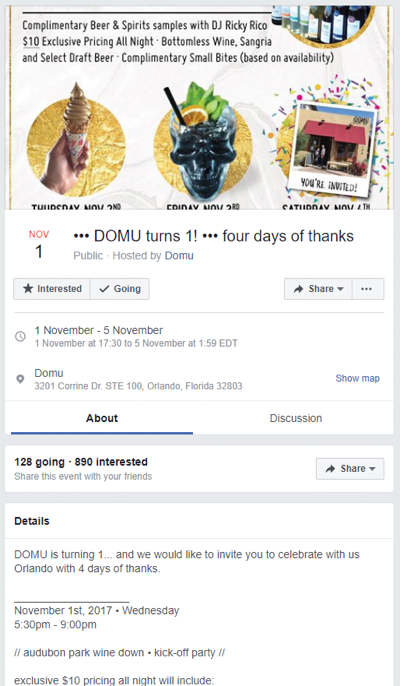
A ramen restaurant located in Orlando creates a Facebook event to celebrate its first birthday. The restaurant owners invite customers to join in by providing detailed information about the upcoming event and the special offers it will feature.
Create how-to videos, share before & after videos/images, or ask your clients to send photos showing use of your products or services to demonstrate the high-quality work you provide. Also, offer incentives like free Wi-Fi, drinks, or discounts to encourage your clients to check into your office or storefront by using the Facebook Places feature. Check-ins will show up as updates on your customers’ timelines, which can help the business get noticed by more people.
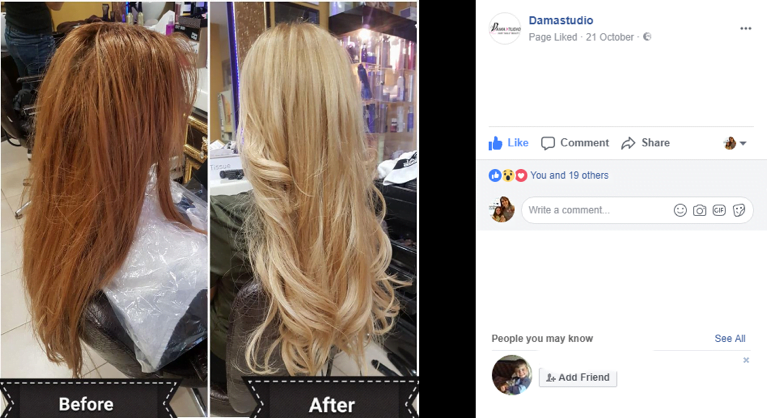
A hair salon posts before-and-after photos to better illustrate what its employees can do to give customers confidence in booking a particular service.
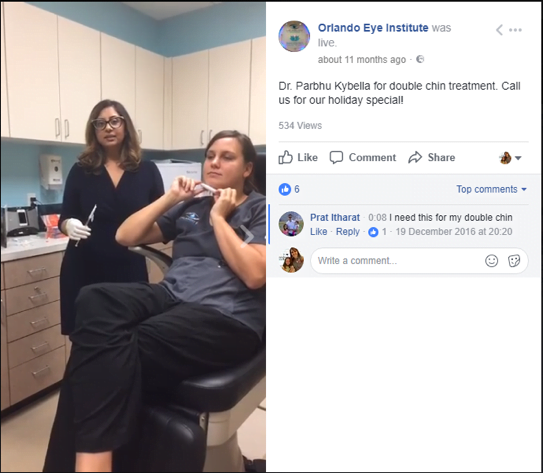
A medical center broadcasts with Facebook Live to interactively discuss double-chin treatment options, the process, and results after the procedure.
5. Don’t: Ignore Your Page Review Section
Don’t get upset about negative comments, and never delete them or ignore users’ opinions. Customer complaints spread like wildfire on social media and can end up harming your company’s reputation, and even cause a decline in physical store traffic and sales. If a customer is grousing over poor service, try to stay calm and don’t rush to fight back. Remember, it’s not personal. Better put yourself in their shoes and send an apology for the caused inconvenience as soon as possible.
Reply to the user by tagging him or her (use the @ symbol followed by name), thank the user for reporting, and explain that you will investigate the situation and work on resolving the issue. You can compensate dissatisfied customers with vouchers, coupons that will get them a free meal/drink, offer them money back, or free stays (if applicable). This kind of proactive approach will stop the crisis before it becomes viral and turn complainers into brand advocates. When other customers see how empathetic and friendly your business is, they will be more likely to make a booking or purchase your products or services.
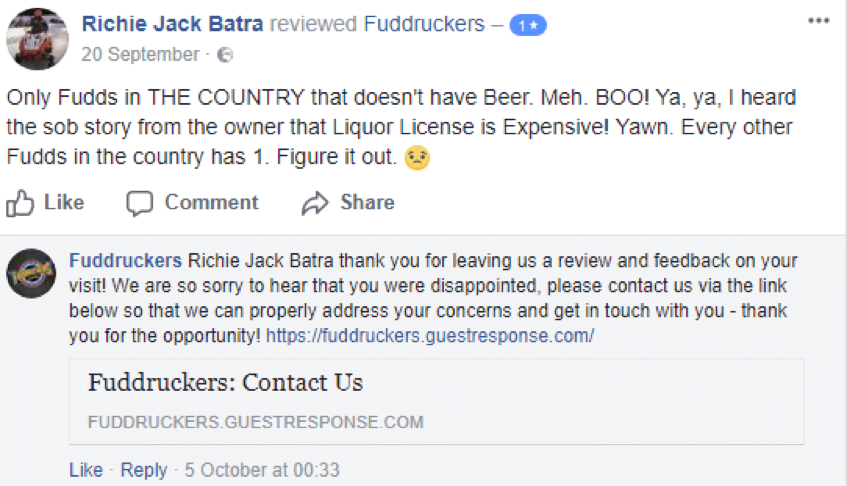
A burger restaurant replies to every upset customer and informs them that he or she has the attention of the restaurant’s owner.
However, if you catch a competitor’s dirty tricks, like posting fake negative reviews from fake accounts on your Facebook Business Page, you can hide, report the post, or even ban the account from your page. No matter how great your services are, you cannot please all the people all the time, but do use customer complaints as a way to learn about potential flaws in your business and learn to improve your services for the future.
6. Don’t: Automate Everything
While you are busy meeting with clients, selling your services and planning your local business, it can be really intimidating to maintain a steady flow of content on Facebook, especially when you don’t have the time and the resources to hire a person or an agency to assist with managing your page. As a result, many page owners resort to using tools like Buffer and Hootsuite to automate their status updates.
However, setting up a given tool to post on your behalf could be a double-edged sword. On one hand, there is a steady stream of posts that keeps your local business visible on the social network. Also, using automation helps you avoid forgetting to publish important updates for your Facebook fans. On the other hand, it’s not a good idea to automate everything. For instance, when customers leave comments the automated tool won’t be able to address those comments. Of course, that will appear totally unprofessional and you risk losing client trust. It would make sense to go the hybrid way by automating messages that promote your business or share tips and informative links, while at the same time posting real-time updates by yourself – for example, local hot news, or live-stream an event happening at your physical location, or a local event that you’re attending or sponsoring.
Remember the reference at the very start of this article? This is definitely part of having to put in some thought and time to create (and maintain) a successful Facebook Business Page!
7. Don’t: Like Your Own Updates
It’s an awkward situation when your official Facebook account appears to have liked its own updates! This could be viewed as a form of vanity or a desperate attempt to get more likes by your page followers. Instead, encourage your staff to like and share your posts immediately after they are published on your Page Timeline. By giving your page a pat on the back, your team members will help you increase the chances of your posts making it into the news feeds of their friends, and thus get more exposure to locals.
8. Don’t: Overshare Posts
It’s good to be active and share posts regularly with your Facebook community. However, some Facebook Business Pages go below normal by sharing only inspirational quotes, or promoting products several times a day. It looks rather spammy and indicates you might lack creativity. You may be asking yourself: How often to post on Facebook? There are a lot of social media frequency studies out there sharing different recommendations. But no matter how often you post, try to diversify your content strategy to improve engagement, and always focus on the quality and relevance of your content rather than the quantity. A good practice is to use a content calendar to organize your social media posts.
Implement the Do’s and Don’ts – and Watch Your Local Facebook Business Page Grow
Facebook is constantly making updates and launching new features to attract small businesses and at the same time, to provide relevant and high-quality content to its users. Implementing the tips above into your social media strategy can help your local business leverage Facebook for improving its online visibility and winning new customers. A well-managed local Facebook Business Page, connecting people offline and online, and effectively executing promotional campaigns will reward you with new customers – and happier existing ones.
What tip above could you start implementing – or stop doing? Do share your experiences in the comments below!
Manuela Gadancheva
Manuela Gadancheva is a digital marketing expert at OptiLocal - SEO agency specializing in Local SEO. She is a knowledge-seeker and is excited about all things SEO, social media, and online ads.


